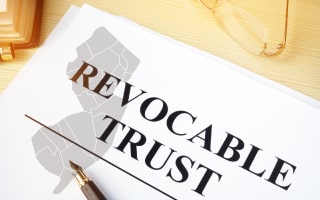How to Find Owners of Properties
in New Jersey

Property ownership in New Jersey is regulated by Title 46 of the state's revised statutes. This title focuses entirely on property, covering everything from rights and interests to powers of attorney,
The recording of documents for properties in New Jersey is governed by Section 46:8D-4. The state requires county clerks to record all real estate documents. After they have been recorded, they must be made available to the public.
Many types of ownership are allowed in New Jersey, which includes trusts and individual ownership. If you need to identify the owner of a property in New Jersey, these records shouldn't be too difficult to find. However, your search may involve additional steps if the property is held by a large corporation or trust.
How Do You Find Owners of a Property in New Jersey?

There are many documents that can contain the names of property owners in New Jersey. You can use numerous methods and sources to obtain these documents, which include public record databases and online resources. Local government offices, such as county clerks and tax assessor's offices, often maintain property records that are available to the public. Additionally, real estate websites and title companies can provide access to property ownership information for a fee.
Registry of Deeds
A registry of deeds is a type of database that houses every real estate document that's drafted when a property is sold or transferred. A registry of deeds is available in every New Jersey county. You can usually find these databases at the county clerk's office or the register's office.
Each county in New Jersey also provides the public with access to online databases, which means that you don't need to visit the registry of deeds in person. These databases include information about everything from liens and encumbrances to property taxes and mortgages. You can access online databases by navigating to your county's website and entering the property's address. Below are the links to the databases for the most populous New Jersey counties:
Land Records Website
Land records are produced when a home or rental property is transferred or sold. These records must be updated regularly with relevant information. You should be able to find land records at the county clerk's office or through their online database. To access this info, you must provide the property address, parcel ID, or owner's name.
City or Town Assessor's Office
The assessor in your town or county is responsible for identifying the value of every home in their jurisdiction. Once they estimate your home's market value, they can determine how much you owe in property taxes. Your local assessor's office holds many property records, which include everything from maps and sales documents to ownership records and tax assessment details.
This information is also available to the public, which means that you can visit your local assessor's office to request documents that might help you find the owner of a property. If you wish to visit the assessor's office in your city or town, use the links below:
- Newark
- Jersey City
- Paterson
- Lakewood Township
- Elizabeth
- Edison Township
- Woodbridge Township
- Toms River Township
- Hamilton Township
- Trenton
Tax Records
Your local assessor's office should also store property tax records. These records contain information about the property's tax history, assessed values, and current ownership. If you want to request a tax record, you should be able to do so online or in person. Visit your local assessor's website to learn more about how you can obtain these records.
Title Company/Agency
A title company is a firm that conducts title searches on behalf of customers. They have access to large databases of property records, which allows them to identify any potential issues with a title. For example, if someone else has a claim to the property, this information should be revealed in the title search. The types of records that title companies have access to include liens, mortgages, and deeds. The average cost of a title search in New Jersey is around $90-$200.
When you're conducting a title search in New Jersey, consider alternative methods that might help you simplify this process. For example, you can search real estate websites that provide ownership details. You can also ask neighbors who might be familiar with the current owner. Consider hiring a real estate lawyer or agent who has local knowledge that might get you the information you're seeking.
![]() Online Services
Online Services
There are numerous commercial service providers and real estate sites that provide comprehensive ownership information, such as PropertyChecker.com. While these platforms aren't as exhaustive as the official records, they can still help you find the name of a property owner. Once you reach the website, input the parcel ID or property address. Along with ownership information, your search should provide you with the following property details:
- Deed records
- Property information, including everything from square footage to renovations
- Building permit info
- Foreclosure details
- Tax assessment information
- Previous sales
- Tax records
- Neighborhood data, which includes crime and safety statistics
- Lien records
- Loan records
What Are the Different Types of Property Ownership in New Jersey?

Property ownership is a broad term that can describe joint owners, individual owners, and legal entities. If you buy a home in New Jersey, with your spouse, the ownership structure will have some unique elements to it that differ from that of sole ownership. Once you understand the many forms of property ownership, you can choose the option that meets your needs.
For example, your investment portfolio might benefit from a joint tenancy structure. The decision you make determines everything from your liability to the types of financing you have access to. The most common ownership types in New Jersey are sole ownership, joint tenancy, and tenants in common. Each ownership title that's detailed below has its own benefits and implications that can factor into your decision-making process.
-
Sole Ownership: One owner has full rights to hold the property. Extensive control over how to manage or sell the property. Sole liability for annual property taxes and debts.
-
Joint Tenancy: Two or more people have equal shares in a home. Shares can be transferred after death without involving the probate process. When an owner decides to sell their shares, the joint tenancy will be severed.
-
Tenants by Entirety: A unique joint tenancy structure that's only available to married couples. Owners have protection from creditors and survivorship rights. Spouses must agree on every property decision.
-
Community Property: Ownership structure occurs when spouses acquire property during marriage. Spouses have equal rights to manage, dispose of, and use the property. The property must be equally divided following a divorce.
-
Tenancy in Common: Multiple owners have equal or unequal shares in a home without having survivorship rights. One owner can choose to sell their rights independently. People may disagree over how to manage or transfer the property.
-
Condominium Ownership: Individuals own units in complexes. Full ownership of personal living space. HOA rules and monthly dues will likely apply.
-
Cooperative Ownership: The residents collectively own an entire property. Since costs are shared, the initial purchase price is lower. If one shareholder decides to sell their interests, the other members must approve.
-
Trust Ownership: Real estate is kept in a trust for beneficiaries. Offers asset protection and numerous tax advantages. The structure of the trust can complicate management and property transfers.
-
Life Estate: Ownership of a property is kept in place until the individual passes away. Able to use the property while they are alive. Transfer or sale of the property can only take place after the remainderman consents.
Finding the Owner of a Trust or Corporation that Owns Properties in New Jersey

Properties in New Jersey can be owned and managed by the following entities:
- Individual owner
- Partnership
- Trust
- Limited liability company
- C or S corporation
When you're interested in identifying the owner of a corporation, trust, or LLC in New Jersey, it's a good idea to hire a real estate attorney or title company. If you choose to conduct this search on your own, the process may require several steps.
For example, this information might be found in a local business directory, such as the Chamber of Commerce. You could also use business research tools like LexisNexis and Westlaw to obtain this info. Consider cross-referencing public records, such as property tax documents and mortgages, to find the name of an owner.
Finding the Owner of a Trust in New Jersey
Trust documents technically aren't recorded anywhere since they are considered private. However, the name of the person who oversees the trust could still be present on certain real estate documents. You can either perform a property search or hire a real estate attorney to help find the owner of a trust.
Finding the Owner of an LLC in New Jersey
The New Jersey Department of the Treasury website provides the public with a "Business Name Search" tool. If you know the company's name or ID number, you should receive documents that contain the name of the owner.
Finding the Owner of a Corporation in New Jersey
If you wish to find the owner of a corporation in New Jersey, you can either use the state's business search tool or the "Business Record Service". If you enter the business name, entity ID, or registered agent name, you'll receive documents about the company that should contain ownership details.
Common Methods of Property Transfer in New Jersey

When a property is transferred or sold, a deed is created to record all the relevant details. Any claims, rights, or privileges to the property will be recorded in the deed. While a handful of different deeds can be drafted during property transfers, the most common ones are detailed below.
-
Warranty Deed: A general warranty deed guarantees that the title is currently free of any encumbrances or liens. If a claim to the property is revealed after the sale goes through, this deed comes with a provision that requires the seller to cover all costs associated with the issue. Keep in mind that a more limited warranty deed can also be used in New Jersey.
-
Quitclaim Deed: This type of deed is regularly used in real estate transactions between family members or divorcing spouses. It doesn't make any guarantees about the title or the owner's rights. When a property is gifted from one party to another, a quitclaim deed will typically be drafted. If a claim is made on the property after the sale closes, the buyer must cover the costs.
-
Bargain and Sale Deed: A bargain and sale deed is similar to a quitclaim one. The main difference is that it covers properties that are sold instead of gifted.
Step-by-Step Guide to Property Transfer in New Jersey

When conveying a property title, there are a wide range of administrative and legal processes that you should understand. This process can only begin once you decide which type of property transfer you wish to use. The various transfers that you can use include everything from sales and gifts to inheritances.
You must also obtain a title search in New Jersey on the property to determine if there are any disputes or liens that need to be resolved. If you purchase title insurance, you'll be able to protect against unexpected problems. This insurance is required by most lenders in New Jersey. The cost of title insurance typically ranges from 0.5%-1% of the sale price.
Before you complete the sale, a deed must be drafted. This legal document includes details about the transfer as well as the names of the buyer and seller. Both parties will need to sign this document in front of a notary public. Keep in mind that you may also need to pay transfer taxes. In New Jersey, sellers are tasked with paying a 1% realty transfer fee.
The deed will then be recorded, after which you'll be handed a receipt. Make sure you update your mortgage provider and local assessor with the details of the sale.
Property Ownership Guide
- How to Find Owners of Properties in New Jersey
- How Do You Find Owners of a Property in New Jersey?
- What Are the Different Types of Property Ownership in New Jersey?
- Finding the Owner of a Trust or Corporation that Owns Properties in New Jersey
- Common Methods of Property Transfer in New Jersey
- Step-by-Step Guide to Property Transfer in New Jersey
New Jersey Homeowner Lookup
- Owner(s)
- Deed Records
- Loans & Liens
- Values
- Taxes
- Building Permits
- Purchase History
- Property Details
- And More!
Property Ownership Guide
- How to Find Owners of Properties in New Jersey
- How Do You Find Owners of a Property in New Jersey?
- What Are the Different Types of Property Ownership in New Jersey?
- Finding the Owner of a Trust or Corporation that Owns Properties in New Jersey
- Common Methods of Property Transfer in New Jersey
- Step-by-Step Guide to Property Transfer in New Jersey